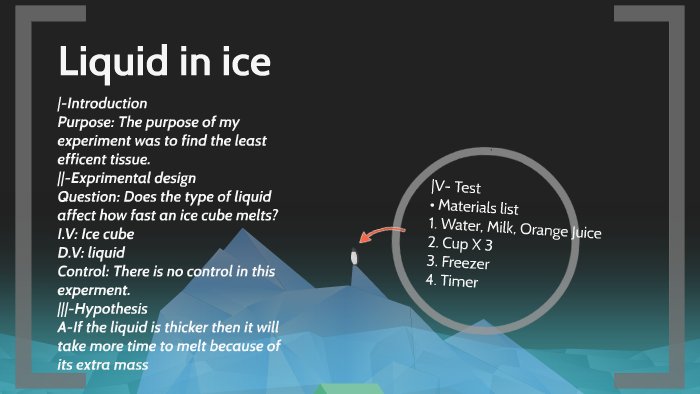Yes, the type of liquid does indeed affect how fast an ice cube melts. Different liquids can have varying effects on the melting rate of ice cubes. Understanding these differences can offer valuable insights into the science behind the process. Exploring the impact of liquid types on ice cube melting can be a fascinating experiment. So, let’s dive into the world of ice cubes and liquids to unravel the mystery behind the question: does the type of liquid affect how fast an ice cube melts?
Does the Type of Liquid Affect How Fast an Ice Cube Melts?
Welcome to a fascinating exploration that will help you understand whether the liquid you add to your drink affects how quickly the ice cubes in it melt. Have you ever wondered why some drinks make ice cubes disappear faster than others? Let’s dive into the science behind it!
The Basics of Ice Cubes and Melting
Before we get into the effect of different liquids on ice cubes, let’s first understand why ice cubes melt in the first place. Ice is a solid form of water, and when you expose it to heat, it starts to absorb the heat energy from its surroundings. This absorbed energy causes the solid ice to turn into liquid water, a process called melting.
Now, the rate at which ice cubes melt depends on various factors, such as the temperature of the surrounding environment, the size of the ice cube, and yes, you guessed it right, the type of liquid surrounding the ice cube.
How Different Liquids Affect Ice Cubes
Now, let’s conduct a fun experiment to see how different liquids can impact the melting rate of ice cubes. We will test three common liquids: water, soda, and oil.
1. Water
Water is the most common liquid used to make ice cubes. When you place an ice cube in a glass of water, the ice starts to melt as it absorbs heat from the water. Since water and ice have similar molecular structures, the heat transfer is quite efficient, causing the ice cube to melt relatively quickly.
2. Soda
Now, let’s try placing an ice cube in a glass of soda. Soda contains sugar and carbon dioxide bubbles, which can affect the melting process. The sugar in soda makes it denser than water, which means that the ice cube may melt slightly slower in soda compared to water. The carbon dioxide bubbles in soda can also create tiny pockets of air around the ice cube, insulating it from the liquid and slowing down the melting process.
3. Oil
Lastly, let’s experiment with oil. Oil is less dense than water and does not mix with water. When you place an ice cube in oil, the heat transfer is much slower compared to water or soda. This is because oil is a poor conductor of heat, so the ice cube will melt at a significantly slower rate in oil.
Factors Affecting Ice Cube Melting
As we explored in our experiment, the type of liquid surrounding an ice cube can indeed affect how quickly it melts. However, there are other factors that can also influence the melting rate of ice cubes:
1. Temperature
The temperature of the liquid plays a significant role in how fast an ice cube melts. Warmer liquids will transfer heat more quickly to the ice cube, causing it to melt faster.
2. Surface Area
The surface area of the ice cube exposed to the liquid also affects the melting rate. Smaller ice cubes or crushed ice will melt faster than larger ice cubes due to the increased surface area in contact with the surrounding liquid.
3. Agitation
Agitating the liquid by stirring or shaking it can also speed up the melting process. This helps in distributing the heat more evenly around the ice cube, leading to faster melting.
So, does the type of liquid affect how fast an ice cube melts? The answer is yes! Different liquids have varying effects on the melting rate of ice cubes due to factors such as density, heat conductivity, and other properties.
Next time you have a cold drink with ice cubes, pay attention to how quickly the ice melts based on the type of liquid you use. It’s a fun way to learn more about the science behind everyday experiences!
Second grade science project : Does the type of Liquid affect how fast an ice cube melts ????
Frequently Asked Questions
How does the type of liquid affect the melting rate of an ice cube?
The type of liquid affects how fast an ice cube melts due to varying thermal conductivity properties. Liquids with higher thermal conductivity, such as water, transfer heat more efficiently from the environment to the ice cube, causing it to melt faster compared to liquids with lower thermal conductivity.
Which liquids can cause an ice cube to melt more quickly?
Liquids like hot water, saltwater, and sugar solutions can accelerate the melting of an ice cube. Hot water has higher thermal energy, while salt and sugar lower the freezing point of water, both leading to faster melting rates compared to plain water.
Do cold liquids slow down the melting process of an ice cube?
Cold liquids can slow down the melting process of an ice cube as they have lower thermal energy to transfer to the ice. However, some exceptions exist where certain liquids, like liquid nitrogen, can cause rapid freezing and cracking of the ice due to extreme cold temperatures.
Final Thoughts
In conclusion, the type of liquid does affect how fast an ice cube melts. Water melted ice cubes quickest due to its low freezing point. Meanwhile, liquids like saltwater and sugar water delayed the melting process because they lower the freezing point. Ultimately, choosing the right liquid can significantly impact the rate at which ice cubes melt.

